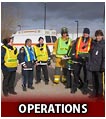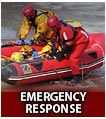




Home > Municipal Support > Page Title


The Fires Prevention and Emergency Response Act (FPERA) is administered by Manitoba Labour and Immigration, through the OFC, and grants the responsibility and authority to safeguard people and property from fire and life safety hazards under the FPERA and regulations. This responsibility is bestowed to the Fire Commissioner, who then delegates this authority to local assistants. These responsibilities may include investigating and reporting fires or emergency response efforts to the OFC. In addition to being responsible for administering the Manitoba Fire Code Regulation and the Fire Inspections Safety Regulation aspects of FPERA, local authorities will also be responsible for developing a record maintenance system for fire inspections carried out within their jurisdiction. OFC is available to assist the local assistant in the performance of these inspections on a fee-for-service basis upon request.
The Buildings and Mobile Homes Act (BMHA) is administered through the OFC, and it grants the responsibility to protect people and property by ensuring buildings are constructed and maintained through the BMHA and its regulations. The BMHA requires that municipalities adopt and enforce codes and standards established under this Act. The BMHA has several codes and standards that have been adopted in Manitoba through regulation that are of significance to Manitoba Municipal Officials, including:
The Municipal Act is the document that establish Manitoba municipalities. Fire protection services are delegated under Part 9 – Duties of Municipalities, Division 3 (Section 264 to 270). These sections of The Municipal Act outline the responsibilities of municipalities as they relate to the provision fire protection services, mutual aid agreements and the powers of a fire protection force and the authority provided to a fire department, which includes taking action to prevent injury and preserving life and property.
The Wildfires Act establishes the responsibility to protect life and property from destructive wildfires and is administered by Manitoba Conservation and Water Stewardship. The objective of the department is to: protect life, property and other resources from fire; provide consistent levels of protection; and to minimize total costs and losses, all of which are central in the provision of an effective fire service. Familiarity with this Act is an important aspect of local fire services being prepared to manage wildfires in their jurisdiction.
The Dangerous Goods Handling & Transportation Act authorizes environmental officers and/or inspectors to control, contain and clean up dangerous goods in the event of an environmental accident. In most emergencies however, the local fire department will be either called first on the scene or the incident to provide decontamination, fire protection or assistance in the clean up. The expectations and responsibilities of each local fire service are articulated in this Act.
The Emergency Measures Act establishes the Emergency Measures Office (EMO) as the organization responsible for assisting local authorities in the preparation of local emergency plans. First responders to an emergency incident include the fire department, local EMS and police. However, it is the fire department that usually has the specialized training, equipment and knowledge to safely and effectively manage many of the large scale emergencies.
The EMO also helps municipalities practice their local emergency plans by conducting simulated exercises within the community. The local fire department is an integral part of local emergency planning and therefore should be involved in the development and exercising of the local emergency plan. Every local authority that prepares and adopts local emergency plans and must review and revise their plans from time to time as required. Knowing the roles and responsibilities of the local service are crucial in emergency situations.
The Highway Traffic Act is the Act which guides the use of emergency vehicles on roadways. All emergency vehicle operators require a minimum of a Class 4 driver’s license and may also require an air-brake endorsement. Emergency response vehicles are Class 4 vehicles and are subject to the provisions of The Highway Traffic Act. There are also provisions in The Highway Traffic Act for municipal fire department members and local ambulance services to use red flashing lights on personal vehicles when responding to emergencies.
The Highway Traffic Act is reviewed as part of the Emergency Vehicle Driving Skills seminar offered by the MESC. Having staff within the local fire service who are familiar with this Act is an incredibly valuable resource.
The Workplace Safety and Health Act sets out to secure workers from risks to their safety, health and welfare in connection with the activities in their workplace. The WSHA applies to all municipal employees that are full time, part time, casual or true volunteer. The safety and well being of responders is as important as that of the citizens being rescued or protected. Personal protective equipment (PPE) such as fire fighter helmets, protective clothing and boots are recognized as essential. However, since the fire service responds to a variety of incidents beyond the typical structure fires, specialized training and PPE specific to the emergency must be provided. It is very important for municipal officials to become familiar with the various response activities that their fire departments are involved in and ensure that the municipal obligations regarding the WSHA and its regulations are being addressed.
The Workers Compensation Act (WCA), which is administered by the Workers Compensation Board (WCB), provides injury and disability coverage for employees, paid for by employers. Emergency response personnel that are full-time, part time, casual, or volunteer, are considered municipal employees or “workers” as defined under the WCA. For casual or volunteer emergency workers, the period of employment begins at the time of the emergency call and until return from the scene. Municipalities must provide compensation coverage for all fire department members.
The WCA now includes presumptive coverage for fire fighters who have suffered injury as a result of primary cancers or have suffered injury to the heart as a result of attendance at an emergency response.
Municipalities and fire departments should maintain current employee records. Reports such as employee training records, emergency response records, medical examination records and exposure reports (where employees may have been exposed to or come in contact with hazardous substances or fumes) are important to protect the employee and municipality years after the emergency response.
Additionally, the Manitoba government recently introduced Presumptive Post-Traumatic Stress Disorder legislation, as amendments to the Workers Compensation Act, that recognizes post-traumatic stress disorder (PTSD) as a work-related occupational disease. This new bill extends coverage and benefits to all workers eligible under WCB who are diagnosed with PTSD by a medical professional. This legislation will ensure timely access to compensation and support services, with the long-term goal of reducing the stigma attached to mental illness. This legislation will ultimately protect front-line workers, like firefighters and first responders, from the challenges they face every time they answer a call.
The Emergency Medical Response and Stretcher Transportation Act(EMRSTA)regulates licensing and standards for emergency medical response and/or stretcher transportation services and their personnel. The responsibility for ambulance services and other Emergency Medical Services (EMS) has shifted in recent years from municipalities to the Regional Health Authorities. However, many municipal fire departments continue to be the first responder, EMS service and familiarity with the EMRSTA is important.
Liability Coverage
Emergency response personnel are encouraged to carry maximum liability coverage in the event that an accident takes place on route to an emergency. Municipalities may be subject to dual liability if the volunteer’s insurance coverage is inadequate. Manitoba Public Insurance Corporation (MPIC) recommends that emergency vehicles be insured for an amount well above basic coverage in order to provide the municipality with the greatest level of protection.
Reimbursement relating to Motor Vehicle Accidents
As of 2009, MPIC covers fire fighting and rescue-related costs for which Autopac-insured motorists would otherwise be legally responsible due to an agreement made with the Association of Manitoba Municipalities (AMM). MPIC will not cover costs in cases such as:
For services provided to vehicles not registered in Manitoba, invoices should be directed to the owner of the vehicle or the insurance company that has insured the vehicle. MPIC will assist in directing the bill to the right place. Contact them at (204)985-7946 for assistance.
Rates have been agreed upon for routine and complexcalls. These adjust every year with the Consumer Price Index (CPI) rate. Claims submitted for amounts exceeding the basic rates must be submitted with supporting documentation and justification.
The Emergency Services Billing Review Committee (ESBRC) will review complaints, disputes and appeals. The ESBRC has representation from MPIC, AMM and the Manitoba Association of Fire Chiefs (MAFC). To submit information to be reviewed, send it to: Manitoba Public Insurance, Bison Drive Service Centre, 15 Barnes Street, Winnipeg, MB, R3T 2H9.
Bill C-45 was established by the Federal Government of Canada on March 31, 2004. It was referred to as the Westray Amendment to the Criminal Code, in memory of the 26 miners that were killed in a tragic coal mining disaster in Pictou County, Nova Scotia.
Bill C-45 added a new Occupational Health and Safety (OHS) duty to the Criminal Code, thereby establishing a new crime of OHS Criminal Negligence in Canada.
Bill C-45 establishes a legal duty for all persons in a position of authority to take reasonable steps to ensure the safety of its workers and the general public. Organizations, including municipal corporations and/or its officers, can be charged with a criminal offence if it is found that they have not taken “reasonable steps to prevent bodily harm” to any person. “Reasonable steps” can include compliance with provincial Workplace Safety and Health Legislation and supporting regulations.